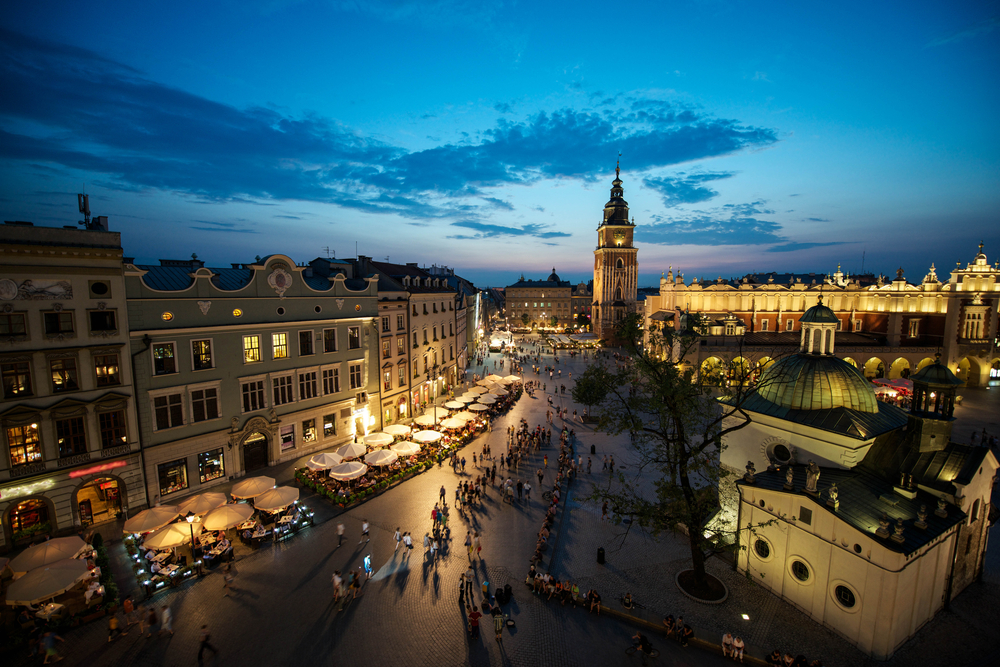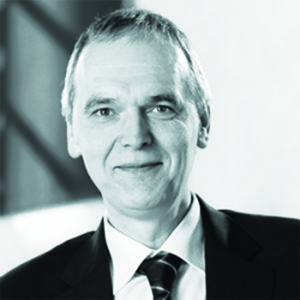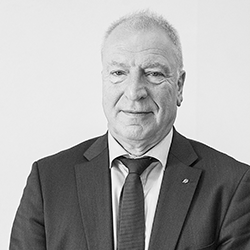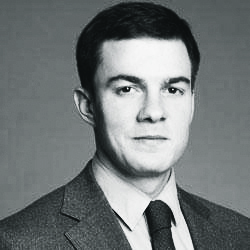Krakow in Poland becomes host city for the Eurovent Summit from September 27 to 30, 2016. Key decision-makers in the field of indoor climate, process cooling and food chain will gather in Krakow to think ‘Beyond HVACR’. Climate Control Middle East speaks to Alex Rasmussen, President; Felix Van Eyken, Secretary General and Morten Schmelzer, International Director, from the Eurovent association, to learn more about the event, the association and key issues of relevance to the sector…

Could you tell us about Eurovent and its activities?
Felix Van Eyken: Eurovent consists of three independent entities. First, the Eurovent association – Europe’s industry association for indoor climate (HVAC), process cooling and food cold chain technologies. It represents Europe’s major sector associations, and more than 1,000 manufacturers from over 25 countries, including leading players from the GCC region.

Felix Van Eyken
Our association monitors and contributes to the development of legislation and its supporting standards. In areas where there is no legislation or where there is no standard, the Eurovent association develops what we call ‘Recommendations’ and ‘Guidebooks’. These tend to develop into standards. The most recent example is the publication of our Air Curtains Guidebook. Also, two new efficiency standards are going to be presented at the Eurovent Summit. We also monitor international developments that may impact the European and GCC region’s industry and represent our members internationally.
Participants will receive insights into European Union’s regulatory developments surrounding ecodesign and energy performance of buildings
Second is Eurovent Certita Certification, which most of the readers of Climate Control Middle East might already be familiar with. This organisation runs over 40 performance certification programmes independently from our association. It is globally known for the ‘Eurovent Certified Performance’ quality mark, which plays an important role in establishing a level-playing field for manufacturers. Eurovent Certification endeavours to fulfil the highest possible standards, and is EN ISO/IEC 17065:2012 accredited.
Third, Eurovent Market Intelligence (EMI). As Europe’s and the GCC region’s statistics office of the HVACR market, EMI has been providing key market data since 1994, and is a trusted partner of more than 300 manufacturers. EMI also runs independently from our association, which has been done in order to comply with the strictest confidentiality standards.
What is the reason for hosting this year’s Eurovent Summit in Poland?

Alex Rasmussen
Alex Rasmussen: Poland has developed into one of Europe’s major markets. The country has great potential and a thriving economy. We want to support the Polish industry in becoming more visible throughout Europe and beyond, and more attractive for investments from abroad. In order for this to happen, the market needs to move away from a largely price-driven approach towards a higher recognition of lifecycle costs and product qualities. We would like that the Polish industry contributes to shaping European legislation, rather than merely following it. The developments at European level are a key to the future evolutions, and do require inputs and follow-up by all industries concerned.
Morten Schmelzer: By hosting this year’s Eurovent Summit in Krakow, we want to bring Poland’s market participants closer to the latest and upcoming technological developments, provide them with essential information on European legislation and standards and offer them the chance to meet and discuss with hundreds of key industry representatives from throughout Europe and the GCC region.
[div class=”text-box text-box-right” style=”background-color: #B70621; color: #FFFFFF; “]
 The Eurovent Summit connects around 400 industry leaders from Europe, the GCC region, Northern Africa and international markets through close to 40 seminars, meetings and dedicated side events. This year’s Eurovent Summit puts a special emphasis on the growing Polish as well as Central and Eastern European markets. The event is organised biennially by Eurovent association, Eurovent Certita Certification and Eurovent Market Intelligence, in cooperation with leading international and national sector organisations, such as eurammon, Polish Ventilation Association and REHVA.
The Eurovent Summit connects around 400 industry leaders from Europe, the GCC region, Northern Africa and international markets through close to 40 seminars, meetings and dedicated side events. This year’s Eurovent Summit puts a special emphasis on the growing Polish as well as Central and Eastern European markets. The event is organised biennially by Eurovent association, Eurovent Certita Certification and Eurovent Market Intelligence, in cooperation with leading international and national sector organisations, such as eurammon, Polish Ventilation Association and REHVA.
[end-div]
How can manufacturers from the GCC region profit from this?
Morten Schmelzer: We observe that many players from the GCC region are considering entering the European market. Why? Because it is a comparatively stable market with long-term growth perspectives. Driven by strict legislation, Europe is more quality-oriented than most other markets, allowing for higher profit margins. Our event offers a very good opportunity to receive insights into regional market developments and potentials. It also provides manufacturers in the GCC region with hands-on knowledge on forward-thinking European legislation and standards.
Could you please elaborate on some of the activities planned during the Eurovent Summit?
Morten Schmelzer: We have partnered with leading national and international sector associations, such as eurammon, Polish Ventilation Association and REHVA, to deliver a series of events that we believe provide a high added value to participants. For example, we have initiated an event called Indoor Climate 2030. This event constitutes a hands-on, forward-looking seminar for building consultants, contractors, designers, manufacturers, planners and everyone else interested in upcoming developments concerning indoor climate technologies. The symposium includes seminars by leading European industry experts and academics.

Morten Schmelzer
Among other things, participants will receive in-depth insights into European Union’s regulatory developments surrounding ecodesign and energy performance of buildings, new testing and rating standards for ventilation equipment, performance certification programmes and market development trends following ecodesign regulations.
Felix Van Eyken: Secondly, our colleagues from REHVA are going to organise dedicated workshops, taking these issues further, while focusing particularly on topics, such as indoor environmental quality (IEQ) and Nearly Zero- Energy Buildings (NZEBs), which all new buildings in the EU have to be by the end of 2020. REHVA, which can roughly be described as the European version of ASHRAE, groups over 100,000 HVACR-related engineers and building consultants in Europe, and updates them with the latest developments at regulatory and standardisation level in the HVACR sector.
We recognise the ever-increasing digitisation of our sector. We understand that our industry produces more than just equipment
Thirdly, a dedicated evening event has been scheduled each day of the Eurovent Summit. One example includes the Eurovent Innovation Hub. In the unique environment of an old tram depot, this reception will offer non-commercial keynote presentations given in a TED-style manner by leading personalities from inside and outside the industry. Another example is the Eurovent/REHVA ‘Climate Chamber’ at the Wieliczka Salt Mine, a UNESCO world heritage site. For this event, we have invited European Commissioners and others to elaborate on market and legislative developments.
Alex Rasmussen: The Eurovent Summit also sees close to 40 working group sessions of the Eurovent association, Eurovent Certification, Eurovent Market Intelligence and REHVA, taking place throughout all event days. The Eurovent meetings are product-focused and provide insights into hot topics, such as ecodesign regulations our members are dealing with. Participants can join any of these meetings regardless of their membership.
Speaking of ‘hot topics’, what in your opinion are key issues the HVCAR sector is facing?
Felix Van Eyken: Together with our national member associations, we have defined several core issues within our new Statement of Principles. Firstly, we regularly highlight the importance of ensuring good indoor air, and the central role ventilation and filtration play in this respect. The aspects relating to the health of citizens is rising on the political agenda, and will start to have an impact on product and building regulations. Also, unfortunately, in the GCC region, we observe that many manufacturers somehow misuse the term ‘indoor air quality’ for pure marketing purposes. This deserves to be changed.
We think in terms of actual applications. We think beyond HVACR and do not strictly separate issues any longer
Secondly, energy and environmental efficiency is and will remain one of our core issues. Our association shapes the development and evolution of legislation, such as ecodesign regulations, which require manufacturers to decrease the energy consumption of their products by establishing minimum energy efficiency requirements.
Thirdly, we recognise the ever-increasing digitisation of our sector. We understand that our industry produces more than just equipment. Smart technologies, Industry 4.0, and the Internet of Things are keywords in this context. The industry needs to be as receptive as possible towards all kinds of digital developments. This could involve new levels of cooperation and an opening up of the association scope beyond manufacturing – following our lead ideal of thinking ‘Beyond HVACR’.
Could you please explain what you mean by ‘Beyond HVACR’?
Alex Rasmussen: Frankly speaking, we are not big fans of the terminology HVACR. Not only does it not sound very appealing, but it also does not rightly reflect the state-of-the-art of our industry. Nowadays, we think in terms of actual applications. We think beyond HVACR and do not strictly separate issues any longer. Accordingly, as an industry, we have established the key areas: Indoor climate, process cooling/refrigeration and food cold chain. We furthermore speak of technologies, and not equipment, taking into account the issues Van Eyken has outlined before.
Any other points our readers should know?
Morten Schmelzer: Yes, all Climate Control Middle East subscribers from the GCC region are going to profit from a 50% discount on the usual ticket rate. They are going to be informed via email and receive a dedicated promotion code.
Copyright © 2006-2025 - CPI Industry. All rights reserved.